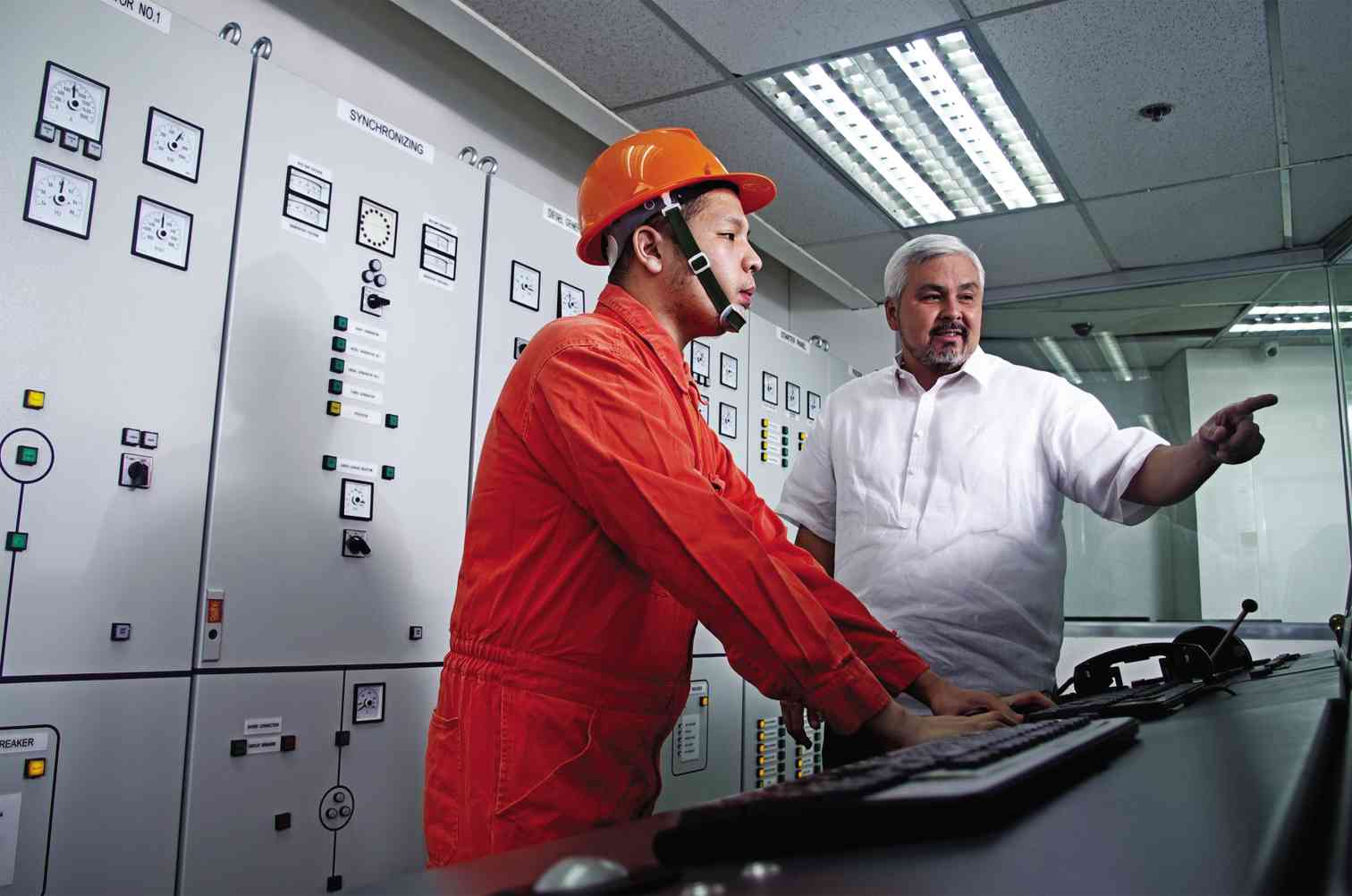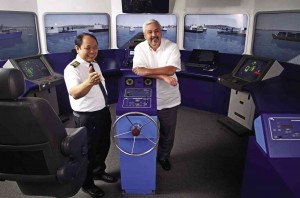Dreaming big for Pinoy maritime pros

PH SEAFARING CAPITAL OF THE WORLD Gerardo Borromeo (right) hopes to instill pride and self-worth in the Filipino “global maritime professional (GMP),” a term he coined for the seafarer who receives excellent training at the PTC center, which makes the Filipinos the world’s seafarers of choice.
Close to one million Filipino seafarers working on global ships have an advocate on the world stage in Gerardo A. Borromeo.
He is the chief executive officer (CEO) of Philippine Transmarine Carriers (PTC), one of the most trusted names in the nation’s crew management industry.
Unlike the veterans of global shipping whom he deals with in international forums of ship owners and managers, Borromeo has only been involved in the maritime industry for the last 10 years, during which time he has developed a real passion for shipping.
A graduate of Massachusetts Institute of Technology, Borromeo’s vision for the industry is to see it transform into a true catalyst of economic development for the Philippines.
Seafarer of choice
PTC’s tagline is “moving the world,” a concept that Borromeo says appropriately describes how the country has taken its maritime heritage into becoming the “seafaring capital of the world,” with Filipinos being the seafarer of choice worldwide.
In 2010, Borromeo was first elected as vice chair of the International Chamber of Shipping (ICS), the first time a Filipino has achieved such a distinction.
ICS is the principal international trade association for the shipping industry, representing shipowners and operators in all sectors and trades, and whose national shipowner members operate over 80 percent of the world’s merchant fleet.

MOVING THE WORLD Borromeo at PTC’s simulation center: “There’s something in our DNA that makes us attractive to employers—our natural affinity to the sea, our skills, our loyalty, concern for others, ability to speak different languages and willingness to do hard work.”
He has since been reelected to this position for a third term. Borromeo was also elected, unopposed, as president of intermanager in 2012, the global trade association for the ship management industry, representing both in-house and third-party ship managers, crew managers and related organizations.
He has recently been reelected for another two-year term.
Borromeo is the first Filipino to head these prestigious international associations. It is here where industry direction and policy are discussed.
Engage in discussions
“Rules are made on the global stage,” says the highly articulate Borromeo. “With one out of every four maritime professionals on board the international merchant fleet from the Philippines, we must actively engage and be part of these discussions.
Such dialogue and interaction often involve close coordination with multilateral governing agencies like the International Maritime Organization, as well as, with individual and regional states.
We have to see what’s coming down the road so we can negotiate the best path for our stakeholders,” he adds.
As CEO of PTC, Borromeo plays a key role in annually deploying over 42,000 Filipino seafarers.
It is a role that he accepts with pride knowing that he is continuing to live out the vision and legacy of PTC founder, Carlos C. Salinas, now the Philippine ambassador to Spain and one of the acknowledged pioneers of the Philippine maritime human resource industry.
Global maritime professional
He emphasizes that the human element is a key driver in shipping. He hopes to instill pride and self-worth in the Filipino “global maritime professional (GMP),” a term Borromeo coined for the seafarer.
No job can be more global than that of the seafarer who moves from one international port to another and must deal with a range of nationalities in the eight or so months in a year that he is at sea.
Borromeo also asserts that the seafarer deserves to be called a professional because he must pass stringent licensing and certification processes before qualifying for a position on board.
Among the nationalities on board the world’s cargo and leisure vessels, Filipinos are considered the “seafarer of choice.”
Crewing capital of the world
Manila, in fact, has become the crewing capital of the world as evidenced by the many international maritime firms that have established large offices here to ensure a steady supply of Filipino maritime manpower globally.
Borromeo remarks: “There’s something in our DNA that makes us attractive to employers—our natural affinity to the sea, our skills, our loyalty, the well-known malasakit (concern), ability to speak different languages, and willingness to do hard work.
The whole persona of the Filipino has made him very visible to this industry and other industries across the globe.”
Yet, working on the world’s ships remains an underrated profession. A generation ago, Filipinos who couldn’t find work anywhere were urged to become seafarers, recalls Borromeo.
Through the years, however, the Filipino maritime professional has proven his worth many times over.
And in so doing, has reaped the trust and confidence of shipowners and has taken on the highest ranks of leadership on board as captain and chief engineer.
Successfully attaining these ranks brings with it very attractive financial rewards. A captain or chief engineer can well command salaries of over $10,000 a month.
In spite of such personal achievements, however, the PTC CEO is disappointed by the fact that these maritime professionals still do not get the recognition they truly deserve.
Somali piracy attacks
He discloses that at the height of the piracy attacks in Somalia in 2012, there were at least 400 seafarers held by the bandits. Of those 400, some 150 were Filipinos but there was little public outcry over their fate.
Through unprecedented efforts by the international community, the Somali piracy phenomenon has since been diffused, with more effective strategies now in place to better curb the situation.
Borromeo emphasizes: “Consider that over 90 percent of world trade goes through ships. Without ships that move coal, crude oil and LNG for example, we would not have the fuel sources available to generate electricity and, therefore, would not enjoy many of the conveniences in life we take for granted. Then consider that it is actually people who work those ships who are responsible for moving products and that at any one time, 30 percent of all those GMPs on board are Filipino. That is the power Filipinos have.”
Borromeo balances his involvement in international maritime associations with driving PTC, which he has positioned to be a maritime human resource development powerhouse.
In partnership with the Mapua Institute of Technology, the Mapua-PTC College of Maritime Education and Training was established to serve as the future source of well-qualified and technically trained officer cadets.
PTC’s whole philosophy is centered around education and continuous professional development.
With more ships being built to meet the demands of increasing world trade, Borromeo notes that more Filipino seafarers need to be motivated to become ship captains and chief engineers, a journey that usually takes up to 14 years to complete.
At the same time, PTC aims to strengthen its bonds with those it deploys by helping them meet their greatest needs which include the opportunity to purchase their own homes.
Borromeo recalls that over a decade ago, seafarers had difficulty getting housing loans because of the contractual nature of their work.
Housing loans
PTC has set up strategic partnerships with several commercial banks in order to help its GMPs secure housing loans. It went a step further and partnered with fast-growing ACM Homes, which is focused on developing affordable quality housing in carefully master-planned urban communities.
ACM Homes has since gone from selling houses in locations limited to Cavite and Batangas. It is now expanding to Iloilo to cater to more GMPs, who comprise 30 percent of its customer base and serves as its anchor market.
With PTC now a majority stakeholder of ACM, Borromeo says: “We offer an opportunity to invest in affordable quality homes surrounded by a community that cares. ACM and PTC go the extra mile for its GMPs by building unique amenities and setting up programs like reading and sports activities for the children and livelihood training opportunities for the wives to provide an educational, productive and sustainable living environment.”
Borromeo also knows that their homes will help the maritime professionals make the transition to on-shore jobs. He dreams of one day seeing the GMP engaged in the country’s emerging shipbuilding industry or working in the Philippine hotel and tourism industry. “It’s all a matter of connecting the dots,” he says with unfailing optimism.